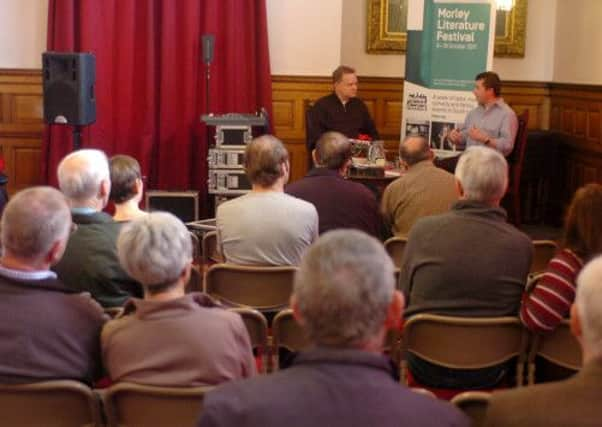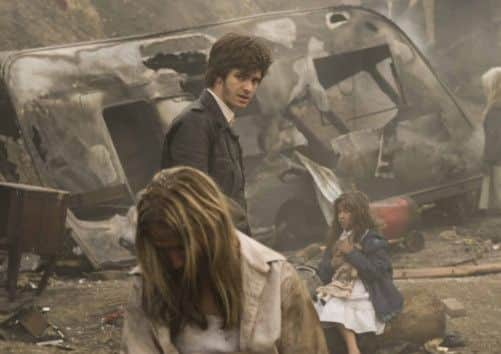Read all about it... rise of the festivals books city a fresh role in literary life


JOHN Freeman probably isn’t planning a trip to Leeds any time soon.
On the day that Granta unveiled its 2013 Best of Young British Novelists list, comprising some of the literary stars of tomorrow, its American editor found himself in a spot of bother. Commenting on the inclusion of Sunjeev Sahota on this list of bright young things, Freeman made reference to the fact he lives in Leeds which was, he said, “completely out of the literary world”.
Advertisement
Hide AdAdvertisement
Hide AdThis, presumably, was a throwaway comment and one that wasn’t intended to cause offence, although these are precisely the kind that usually do. Not only were Freeman’s remarks ill-judged, they were also plainly wrong. Leeds might not be the cultural Mecca that London claims to be, but it’s anything but a literary backwater.


Sahota is just the latest literary talent to emerge from Leeds, a city that over the years has produced such famous names as Alan Bennett, Barbara Taylor Bradford, Keith Waterhouse and Tony Harrison. If anything, Leeds has a bigger and more vibrant literary scene now than it ever has before and you only have to look at the number of book festivals that have established themselves here during the past decade.
The annual Morley Literature Festival has carved out an impressive reputation across the country with its broad programme of author interviews, workshops, comedy and music and last year pulled in more than 2,000 people to 27 events. The festival, which this year runs from October 5 to 13, has attracted the likes of Kate Adie, Stuart Maconie, Iain Banks and Will Self, since it started in 2006. Not bad for a small market town best known for being the birthplace of former Prime Minister Herbert Asquith and mill owner and philanthropist Sir Titus Salt.
If October is too long to wait then next month sees the return of the The Big Bookend Festival, following its successful debut last year. Billed as A Rock Festival for Words in Leeds, The festival, which takes place on June 8 and 9, sees Tony Harrison returning to his home city for a reading at West Yorkshire Playhouse.
Advertisement
Hide AdAdvertisement
Hide AdFiona Gell, who co-founded the festival with her friend Liz Ward, says they were inspired to get the ball rolling after listening to writer Anthony Clavane speaking at an event a couple of years ago. “He said he couldn’t understand why Leeds doesn’t shout about how great it is more often and we thought ‘he’s right, we should do something about this.’”
They quickly put together a team of volunteers and within six months the inaugural Big Book Festival was up and running, attracting more than 400 people. “That’s not bad given that we didn’t have much time, because really we used the first one as a guinea pig to see if we could do it,” she says.
Without any public funding they’ve had to raise money themselves through sponsorship and the generosity of locals giving up their time for free. “Our printing and publicity material was done for free as was our website and it’s been incredibly heartening to see this generosity of spirit from people in Leeds.”
Gell is one a team of seven volunteers who organises the festival which is hosting events at a series of city centre venues. “We all have day jobs and in our spare time we try and put together a book festival.”
Advertisement
Hide AdAdvertisement
Hide AdThis year’s Big Bookend includes a pop-up festival at Leeds Trinity and LS13, a new anthology to find the best 20 writers in the city under the age of 40. But getting Tony Harrison on board is not only a huge coup it also puts the festival on people’s radar.
“We’re absolutely delighted and it’s the pinnacle of what we’ve done. Our aim is to help encourage new writing talent and also to celebrate Leeds’s literary heritage which is embodied by Tony Harrison.”
She hopes The Big Bookend will continue to grow and offer as wide an audience as possible a chance to meet authors and get more involved with reading and books.
“Leeds is a great city with lots of diverse nationalities, but it also has some deprived areas where people don’t have easy access to books and words, and that’s what we’re trying to change by making events accessible and keeping ticket prices low,” she says.
Advertisement
Hide AdAdvertisement
Hide Ad“We want to establish this as part of the city’s cultural identity so that it’s a date people put down in their calendar, but at the same time we want to get away from the literary tag because that can put some people off.”
There are, of course, no shortage of literary events in Yorkshire. The Crime Writing Festival down the road in Harrogate has become a huge success, and is now the biggest festival of its kind in the world, while the Ilkley Literature Festival needs no introduction having been going for the past 40 years.
But with several book festivals now in and around Leeds as well, isn’t there a danger they could cancel each other out?
“I think we’re very different from Harrogate and Ilkley,” says Gell. “And I don’t see us being in competition with one another in Leeds, either. We each have our place and our own character and I think we’re mutually supportive.”
Advertisement
Hide AdAdvertisement
Hide AdThis year’s annual Headingley LitFest took part in March with Kay Mellor and Roger McGough among the headline acts. The festival has been going for six years during which time it’s featured well known names such as Blake Morrison, Ian McMillan and Beryl Bainbridge.
Its founder, former journalist and teacher Richard Wilcocks, set it up as a way of celebrating Headingley’s literacy legacy. “It started out as a community thing to assert the identity of Headingley which we felt was getting a negative press a few years ago and we wanted to bring a bit of balance back,” he says.
But he was surprised how much interest there was from the beginning. “After the first year we were amazed how popular it was. We had people stopping us in the street and asking when the next one was and it’s continued to be popular ever since.”
As well as enticing well known authors to bigger venues, the LitFest also holds smaller events in local community centres and cafes. “Sometimes people are queuing out of the doors which is great. But we haven’t just gone for an older audience, we try and do something for everyone which is why we’re doing a youth fringe in June.”
Advertisement
Hide AdAdvertisement
Hide AdRunning a festival like this is hard work but Wilcocks is proud of what’s been achieved. “It’s grown each year and it’s become more elaborate but I think it’s grown as much as it can, which is fine because it’s very much part of the community here now.”
What’s happening in Leeds, of course, is a reflection of a growing interest nationwide in books and reading in general. Anthony Clavane, author of The Promised Land, doesn’t think we’re necessarily seeing a literary revival in Leeds – it’s just that more authors writing and talking about the city.
“We’ve seen David Peace writing about Leeds with The Red Riding Trilogy and The Damned United, and there’s writers like Wes Brown and Ben Tagoe who are part of a new generation taking Leeds stories to the nation.”
It’s a shift from the past when Leeds tended to be talked down. “There’s a Harry Enfield sketch where his character goes ‘don’t talk to me about sophistication, I’ve been to Leeds,’ and everybody laughs. But the irony is that the kitchen sink novelists from the 50s, people like Stan Barstow, Keith Waterhouse and Willis Hall, who came from Leeds or West Yorkshire, were hugely influential,” he says.
Advertisement
Hide AdAdvertisement
Hide Ad“For a long time Leeds’s literary tradition has been kept under wraps, we’ve almost been too self-deprecating about it. But in recent years there’s been a greater sense of pride about the great writing talent that’s come out of the city and festivals are a great way of shouting about our literary heritage from the rooftops.”
For information about The Big Bookend visit www.bigbookend.co.uk/about or call 0113 237 9900. For information on the Morley Literature Festival go to www.morleyliteraturefestival.co.uk. To find out about the Headingley LitFest log on to www.headingleylitfest.org.uk
LEEDS’S PAGES OF HISTORY
Leeds has produced many important literary figures over the years.
Alan Bennett was born here and is widely regarded as one of the finest authors and playwrights of his generation.
Advertisement
Hide AdAdvertisement
Hide AdBarbara Taylor Bradford is a former local reporter who shot to fame with her 1979 debut, A Woman of Substance.
Tony Harrison’s poem V was written in 1985, after he discovered football hooligans had desecrated his parents’ gravestones with obscene graffiti at Holbeck Cemetery.
Keith Waterhouse, born and raised in Hunslet, is best known for his 1959 novel Billy Liar which was turned into a film starring Tom Courtenay.